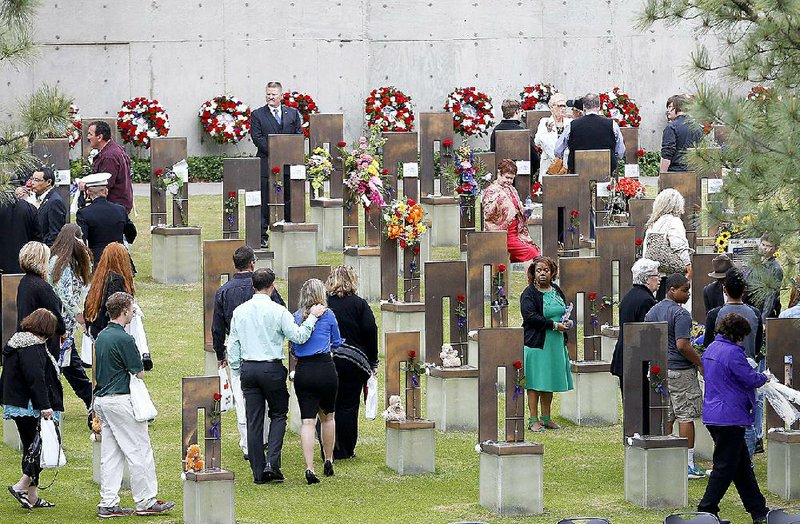OKLAHOMA CITY -- About 1,000 people gathered Sunday to commemorate the 20th anniversary of the Oklahoma City bombing, the deadliest terrorist attack on U.S. soil until the Sept. 11 attacks six years later.
Former President Bill Clinton and Oklahoma Gov. Mary Fallin were among those who spoke at Sunday's service at the Oklahoma City National Memorial and Museum, where the Alfred P. Murrah Federal Building once stood.
The service started with a 168-second moment of silence to honor each of the 168 people who died in the April 19, 1995, attack. It concluded about 90 minutes later with survivors and tearful relatives of the dead reading the names of those killed.
"This was a place of unspeakable horror and tragedy," said Frank Keating, who completed his first 100 days as Oklahoma's governor the day before the attack. "How some evil individual would do what he did ... is unforgivable and absolutely unimaginable."
FBI Director James Comey and others paid tribute to those who took part in the recovery efforts.
"In an instant, this day was transformed into a moment of history, a moment of unspeakable horror and darkness," Comey said. "It is not the moment that defines us. It is not the act itself that shapes our destiny. It is what comes next."
But it fell to Clinton to underscore the true significance of this anniversary.
"I prepared for this day yesterday, in New York, by taking Hillary to see our daughter and son-in-law and my about-to-be 7-month-old grandchild," he said. "And Hillary and I bathed her and fed her and put her to bed, and I looked at her in that crib so I could remember how you felt, those of you who lost your loved ones."
Nineteen children, mostly in a day care center for federal employees in the Murrah Building, were among the victims of bombing. The memorial to the bombing includes 168 stylized chairs to commemorate those who were killed; among the roses and sprays of flowers on them Sunday, balloons and teddy bears decorated some of the smaller ones.
After the service, LaDonna Battle and her family were standing between two of the metal and glass chairs, inscribed with the names of her parents, Calvin and Peola Battle, who were arranging to receive Social Security benefits when the bomb detonated.
"We're completing a journey with steel hearts. We're rebuilding our lives." LaDonna Battle said.
In a statement from the White House, President Barack Obama thanked first responders who risked their lives after the bombing, law enforcement and prosecutors who brought the perpetrators to justice, and ordinary men and women in Oklahoma for their resilience.
"If those murderers hoped to terrorize the American people that day, to break our spirits or shatter the bonds that unite us, then they completely and utterly failed," Obama said.
The Oklahoma City bombing was quickly traced to Timothy McVeigh, an Army veteran with strong anti-government views.
McVeigh planned the bombing as revenge for the deadly standoff between the FBI and Branch Davidians in Waco, Texas, that killed more than 70 people on April 19, 1993 -- exactly two years earlier.
McVeigh was found guilty in 1997 and executed in 2001; a co-conspirator, Terry Nichols, was sentenced to life in prison, and a third conspirator, Michael Fortier, was released after 12 years in prison.
Information for this article was contributed by Tim Talley of The Associated Press and by Michael Wines of The New York Times.
A Section on 04/20/2015
